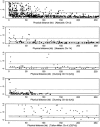Linkage disequilibrium in humans: models and data
- PMID: 11410837
- PMCID: PMC1226024
- DOI: 10.1086/321275
Linkage disequilibrium in humans: models and data
Abstract
In this review, we describe recent empirical and theoretical work on the extent of linkage disequilibrium (LD) in the human genome, comparing the predictions of simple population-genetic models to available data. Several studies report significant LD over distances longer than those predicted by standard models, whereas some data from short, intergenic regions show less LD than would be expected. The apparent discrepancies between theory and data present a challenge-both to modelers and to human geneticists-to identify which important features are missing from our understanding of the biological processes that give rise to LD. Salient features may include demographic complications such as recent admixture, as well as genetic factors such as local variation in recombination rates, gene conversion, and the potential segregation of inversions. We also outline some implications that the emerging patterns of LD have for association-mapping strategies. In particular, we discuss what marker densities might be necessary for genomewide association scans.
Figures




References
Electronic-Database Information
-
- Gil McVean web site, http://www.stats.ox.ac.uk/~mcvean/ (for estimation of ρ)
-
- Hudson Lab Home Page, http://home.uchicago.edu/∼rhudson1/ (for simulation of the coalescent with recombination [see the program “mksamples”] and estimation of ρ [see the article “Two locus sampling distributions and their application”)
-
- Human Recombination Rates web site, http://eebweb.arizona.edu/nachman/publications/data/microsats.html (for estimation of c)
-
- Nordborg web site, http://www-hto.usc.edu/people/nordborg/papers.html (for the article “Linkage disequilibrium, haplotype evolution and the coalescent”)
-
- Paul Fearnhead web site, http://www.stats.ox.ac.uk/∼fhead/index.html (for estimation of ρ [see the article “Estimating recombination rates from population genetic data”])
Publication types
MeSH terms
LinkOut - more resources
Full Text Sources
Other Literature Sources
Research Materials

